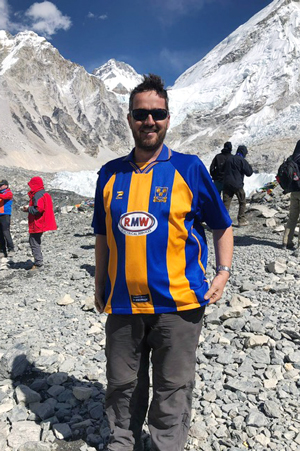Bryan's Story

In his late twenties, Redcliffe father-of-two Bryan Marshall began experiencing unusual sensations in his body. Although difficult to describe, he said the feeling was like a brief rising sensation in the stomach mixed with a sense of fear. He assumed it was related to stress.
That was until he woke up in an ambulance headed to Royal Brisbane and Women’s Hospital (RBWH) after having a generalised seizure at work.
Bryan was later told that what he had been feeling was in fact a form of seizure and he was diagnosed with epilepsy.
“I never knew that I was having a seizure, although they were quite regular, I would simply ‘zone-out’ for three of four seconds at a time,” Bryan said.
“My wife Karin noticed them more than I did, and most interestingly my dog Seymour would always be sitting at my side during the seizure.”Epilepsy can be controlled by medication in about 70 percent of patients, however for Bryan, medication was not able to hold the seizures at bay.Clinicians worked with Bryan to add a second and then a third medication in a bid to control his symptoms, but as time went on, life was becoming more and more narrowed.
Bryan was more dependent on his wife than ever before and was unable to drive, a restriction extremely difficult to bear with a young family. His safety on his much-loved adventure treks was also questioned.
But in 2014, doctors at the Queensland Comprehensive Epilepsy Program based at RBWH were able to offer Bryan the opportunity to undergo evaluation for surgery.
“It was a lengthy process to be considered for surgery, involving a number of inpatient and outpatient tests, including numerous brain scans and psychological tests,” he said.
“The most significant test was a four-day inpatient admission where they induced seizures by reducing my medication and watched me and my brain carefully to see where the seizures were coming from.”
The multidisciplinary epilepsy team were there to guide and support him along the way, as they worked to understand whether the seizures were coming from a single point and if removal of that part of the brain could be performed safely.
The evaluation showed that Bryan would be a good candidate for surgery.
“I didn’t worry too much because of all the work the clinicians had done in the lead up, I honestly didn’t think it would go badly,” he affirmed.
“All of the clinical information and expected outcomes were clear and discussed with me in a friendly and personal way.”
In 2017, Bryan underwent a successful surgery and following a short recovery returned to work and normal life. His medications were reduced greatly to a small dose of anti-epileptic medication and a year later he was able to drive again.
“Since the surgery I haven’t experienced any significant change, although sometimes I find it difficult to recall information like people’s names, with concentration it all comes back,” Bryan said.
“The team who cared for me and my family were fantastic; absolutely brilliant people and health professionals.”
18 months after surgery, Bryan travelled to Nepal and was the only member of his group to complete a gruelling 21-day course of one of the most extreme treks in the Everest region.
“In reality, the epilepsy journey I have been on is what gives me the desire and attitude to live my life to the fullest, take on every challenge and reach for the skies,” he said.
“I consider myself extremely lucky to have been able to receive such exceptional care, and for that I am grateful to everyone at RBWH who has and will continue to care for me for years to come.”
Contact us
Location: Level 7, Ned Hanlon Building
Phone: (07) 3646 3111
Fax: 07) 3647 62632
Open: Monday-Friday 7.30am-4.30pm
Need help outside hours?
For non-urgent medical issues call 13 HEALTH (13 43 25 84) or visit your GP.
In an emergency call 000.
Refer a patient
To refer a patient to this service, view the Epilepsy referral guideline.
For an existing referral call 1300 364 938.
